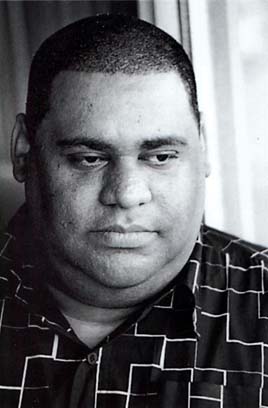
introducing readers to writers since 1995
March 24, 2004
We're Going to Graceland, Graceland...
by Ron Hogan Salman Rushdie put in his first public appearance as the newly elected president of PEN American Center Monday night to introduce the first in a series of "Foreign Exchanges" which bring an American author and a foreign author together in conversation. This time around, Walter Mosley met with Chris Abani, whose novel Graceland has recently appeared to much critical acclaim. (See, for example, the review from the perhaps unfortunately named Hackwriters or Sophie Harrison in the NYTBR--then again, Paul Demko in the Twin Cities City Pages found it "a sprawling mess," despite admiring Abani's depiction of the chaotic conditions in Lagos.)
Salman Rushdie put in his first public appearance as the newly elected president of PEN American Center Monday night to introduce the first in a series of "Foreign Exchanges" which bring an American author and a foreign author together in conversation. This time around, Walter Mosley met with Chris Abani, whose novel Graceland has recently appeared to much critical acclaim. (See, for example, the review from the perhaps unfortunately named Hackwriters or Sophie Harrison in the NYTBR--then again, Paul Demko in the Twin Cities City Pages found it "a sprawling mess," despite admiring Abani's depiction of the chaotic conditions in Lagos.)
But before the conversation, came the celebrities.
Bill Irwin read from one of the novel's opening scenes, in a wonderful voice that had me trying to remember which radio announcer or documentary narrator it reminded me off. Then, when the dialogue came, he perfectly captured the accents and cadences of southern tourists. Next, Alfre Woodard read from a little further into the novel, a conversation between the novel's protagonist, a young Elvis impersonator of the Igbo tribe, and a Lagos native about the absurd levels of self-destructiveness and corruption in the city. She also read a poem from one of Abani's earlier books, Daphne's Lot, about the death of his father.
Then Mosley and Abani came out and took their seats, with Mosley praising the prose in Graceland for being "so eloquent without calling attention to itself." A question about whether Abani felt like a "writer in exile" led to the story of his three different stays in Nigerian prisons, incidents about which the author was impressively humble, pointedly saying that he didn't want to be singled out at the expense of the cause for which he and others were fighting. This after telling the audience that he'd first been held captive at the age of 18, simply because a thriller he'd written about an invasion of Nigeria was found in the possession of a military officer plotting a coup. Later jail stays came due to his active involvement in activist theater; at one point, he shared a cell with Nigeria's most famous entertainer/rebel, the legendary Fela Kuti, who upon learning why Abani was there, laughed and declared, "You know, my young friend, the truth is a risky business."
Part of the point of the "Foreign Exchanges" series, as Rushdie mentioned in his opening remarks, was the notion that Americans need now more than ever to hear from (and engage in dialogue with) people in other parts of the world, so it wasn't terribly surprising when, at Mosley's not-so-subtle prompting, a bit of America-bashing crept into the conversation, with Abani's description of the United States as "a nation of people who have gone to sleep and don't question things" drawing enthusiastic applause from the audience of New York sophisticates, who undoubtedly felt proud of themselves for not being one of the people Abani was thinking of. Not that I agree or disagree with his assessment; it just struck me as a somewhat easy bone to throw to the crowd, even as he joked about jeopardizing his immigration status before making the comments. While some might suggest that he's got it easy in the States, though, compared to his homeland, Abani pointed out that he's still subject to occasional incidences of racism--and, since he didn't grow up exposed to them as African-Americans did, he hasn't yet learned how to fully dismiss them. (On the other hand, he points out, in America it's genuinely possible for emigrés to make mainstream success for themselves, whereas in London--where he lived first after leaving Nigeria--one's "Otherness" may have been accepted, but only as "Other," with little hope of genuine assimilation.)
After talking at length about his writing methods (always working on poetry and prose simultaneously), life in East Los Angeles, and various aspects of Igbo culture, Abani closed by reading another passage from Graceland, this time a harrowing depiction of a lynching by immolation which he followed with an improvisatory performance on the saxophone intended to depict in music the scene he'd just read. I'm not the one to tell you whether that effort was a success, though it was pretty competent sax playing with a strong vibe of what I'd tentatively call West Coast jazz to it. And that was it--until the next "Foreign Exchange" in May, when vagina monloguist Eve Ensler will chat with Azar Nafisi about reading Lolita (and other works of Western literature) in Tehran. (She can undoubtedly use this interview by Robert Birnbaum as research...)
your PayPal donation
can contribute towards its ongoing publication.